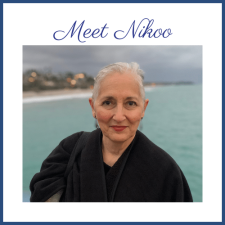Many women with lobular breast cancer have found the Lobular Breast Cancer Alliance (LBCA) after they were diagnosed. They want to help build a community among peers, to share the most current information about invasive lobular carcinoma (ILC) detection, treatment and clinical trials, and to raise awareness about this common yet understudied breast cancer subtype that needs more research. Sharing their stories is one of those ways.
Meet Nikoo
My name is Nikoo. My husband Jim and I live in Southern California. We are proud parents of two sons and two grandchildren. I’m a mechanical engineer turned novelist, and for the past three decades Jim and I have collaborated on many works of fiction.
My ILC story started in 2003 when my general practitioner noticed a hard tissue in my right breast during my annual exam. I had just gone through a clear mammogram the week before. At the time we were living in Connecticut, and an ultrasound and a biopsy identified the tumor as 0.9 cm lobular breast cancer. I went through a lumpectomy and radiation and five years of tamoxifen, and all the stats I was given ran along the lines that they found the cancer early, and I was cured.

Fast forward to earlier this year. Nineteen years later. Out of nowhere, I developed food sensitivity. Most days, I was nauseous and bloating. Last year, I had a clear endoscopy and colonoscopy. When I went back to my gastroenterologist, she prescribed antacids to ease the symptoms. They made no difference. I also started losing weight, which she blamed on irritable bowel syndrome and asked me to follow the FODMAP diet. Still, something was wrong. I knew my body.
I went for a second opinion to my general practitioner. She suspected issues with my gallbladder and ordered an ultrasound. The ultrasound was followed a week later with a CT scan. The report said, ‘soft tissue thickening at the distal right ureter with proximal severe hydroureteronephrosis.’ The same report also noted multiple sclerotic foci throughout the visualized skeleton, concerning for metastatic disease, and small volume ascites.
Immediately I was scheduled to meet with a urologist for a stent in my ureter. A biopsy of the ureter and bladder showed inflammation only. By this time, I had sought the care of an oncologist in Los Angeles who went into full diagnosis mode. All of my scans kept coming back inconclusive. At the same time my Cancer Antigens 27-29 and CA-125 were extremely high. My oncologist said, “I think you have cancer, but we can’t find it. How about if we repeat everything in six months?”
I couldn’t wait. I made an appointment with a new gynecologist and then a gynecological oncologist. His suspicion was ovarian cancer, and he decided to do a scope of my lower abdomen. A week later, I had my diagnoses: metastatic lobular breast cancer with metastasis to peritoneum, ascites, and possibly bone cancer. ER+, PR+, HER2 -. My cancer of 19 years ago had metastasized.
Was it tough to hear this? Yes.
Cancer robs a person of control. I needed to gain some of it back through knowledge.
Immediately I joined the Facebook group Support for People with Metastatic Lobular Breast Cancer. Through them I learned about the Lobular Breast Cancer Alliance (LBCA). I devoured LBCA’s virtual forum series…webinar series, ILC fact sheet. It was empowering to have such an invaluable resource. To know why it was that my cancer was ‘almost’ missed the first time and again this year. To know why the doctors, even in research hospitals, knew so little about ILC. Also, LBCA reaffirmed in my mind how important it was for me to be my own advocate.
Thank you, Leigh Pate, the founder of LBCA. Your work, your passion, your advocacy, and the amazing organization that is your legacy is helping many patients like me every day. You’re greatly missed.
Are you interested in telling others about your own lobular breast cancer story? Please email communications@lobularbreastcancer.org to request more information on how to submit your story. For more information about lobular breast cancer or to make a gift visit lobularbreastcancer.org.

